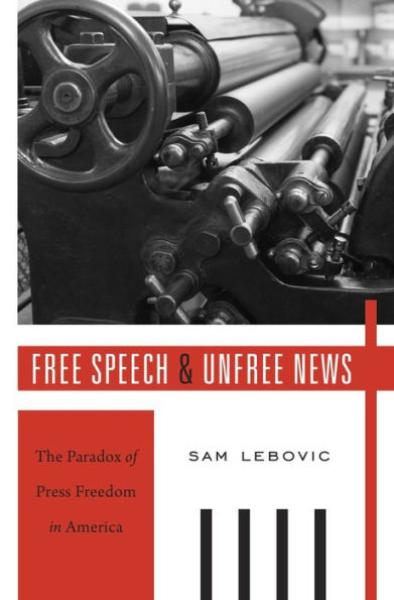Description
Does America have a free press? Many who answer yes appeal to First Amendment protections that shield the press from government censorship. But in this comprehensive history of American press freedom as it has existed in theory, law, and practice, Sam Lebovic shows that, on its own, the right of free speech has been insufficient to guarantee a free press.
Lebovic recovers a vision of press freedom, prevalent in the mid-twentieth century, based on the idea of unfettered public access to accurate information. This "right to the news" responded to persistent worries about the quality and diversity of the information circulating in the nation's news. Yet as the meaning of press freedom was contested in various arenas--Supreme Court cases on government censorship, efforts to regulate the corporate newspaper industry, the drafting of state secrecy and freedom of information laws, the unionization of journalists, and the rise of the New Journalism--Americans chose to define freedom of the press as nothing more than the right to publish without government censorship. The idea of a public right to all the news and information was abandoned, and is today largely forgotten.
Free Speech and Unfree News compels us to reexamine assumptions about what freedom of the press means in a democratic society--and helps us make better sense of the crises that beset the press in an age of aggressive corporate consolidation in media industries, an increasingly secretive national security state, and the daily newspaper's continued decline.
Does America have a free press? Many who say yes appeal to First Amendment protections against censorship. Sam Lebovic shows that free speech, on its own, is not sufficient to produce a free press and helps us understand the crises that beset the press amid media consolidation, a secretive national security state, and the daily newspaper's decline.
Sam Lebovic is Assistant Professor of History at George Mason University.
Free Speech and Unfree News: The Paradox of Press Freedom in America appears at an opportune moment in history...This is a thorough historical analysis that highlights the tension between an American commitment to a narrow definition of press freedom and access to, and reporting of, news that contributes to democratic self-government. It is superbly organized and very readable.-- (12/01/2016)
[A] smart--and timely--book.--Nicole Hemmer"U.S. News and World Report" (06/06/2017)
[Lebovic] argue[s] that the dominant conception of civil liberties is insufficiently ambitious. [He] worr[ies] that as formulated, civil liberties are as much a tool for the powerful as for the powerless...Offer[s] important correctives to the celebratory accounts of civil liberties that we so often tell ourselves.-- (03/23/2017)
A deep examination of the legal, political, social, and cultural discussions of the role of the press in America in the twentieth century...It [offers] a narrative that is lacking in other classic press freedom books.--Daxton R. "Chip" Stewart"Journalism History" (04/01/2017)
At every stop on this wide-ranging tour of twentieth-century America, Lebovic's research is deep and persuasive...Free Speech and Unfree News is a splendid history of the travails of twentieth-century American journalism.--David Paul Nord"Journal of Social History" (09/01/2017)
Examines the hazy relationship between press freedoms and the actual execution of the press's democratic mission...An engaging, well-written book about an enduring problem in American democracy.--Jared Schroeder"Political Science Quarterly" (01/01/2018)
Interesting, nuanced, and thoughtful...A relevant and thought provoking book.--Bonnie Brennen"Journal of Communication" (04/01/2017)
Lebovic's book is compelling reading. Well researched and written, it does a masterful job of logically weaving together the legal, social, economic, and political threads that have created the fabric of American press freedom.-- (09/01/2017)
One of the virtues of Free Speech and Unfree News is its resurrection of mid-century arguments long buried by the conventional wisdom of the media industries...Those hoping for a happier history will have a hard time dismissing this book. Its research, both historical and legal, is broad and deep.-- (07/01/2017)
Extremely original and well-written...[Lebovic] shows fascinating relationships among many different topics that have not previously been juxtaposed.--David M. Rabban"Reviews in American History" (06/01/2017)
How could a nation proud of its commitment to free expression also be a place where journalists must scour through leaked documents to learn basic facts about government policies? Sam Lebovic's spectacular and important book shows how the idea of a 'right to know' dropped out of twentieth-century understandings of the First Amendment. Essential for understanding what has become of an American free press.--Mary L. Dudziak, author of War Time: An Idea, Its History, Its Consequences
Provocative and stimulating. Lebovic shows that, although the American press has grown unusually free from government interference, it is constrained by the vast expansion of government secrecy and the intensification of the profit motive in the shifting news marketplace.--Michael Schudson, author of The Rise of the Right to Know
Product Details
- Harvard University Press Brand
- Mar 14, 2016 Pub Date:
- 0674659775 ISBN-10:
- 9780674659773 ISBN-13:
- 352 Pages
- 9.4 in * 6 in * 1 in Dimensions:
- 1 lb Weight:




